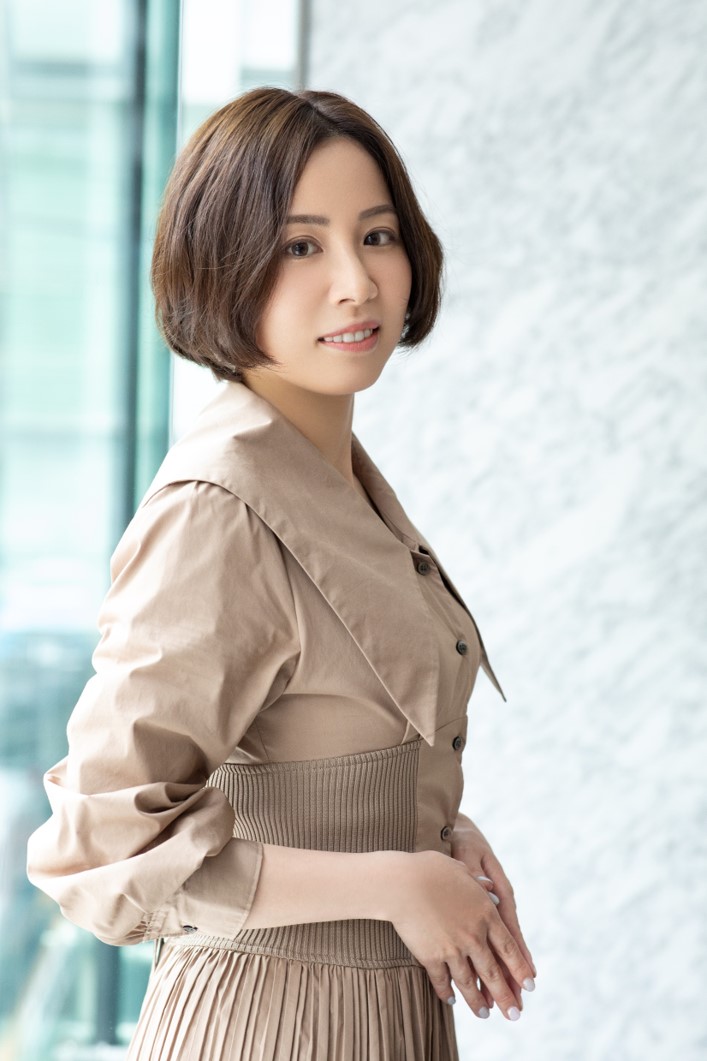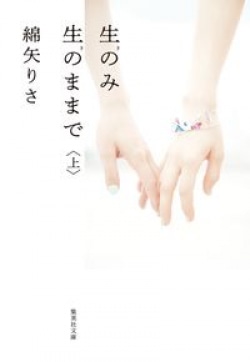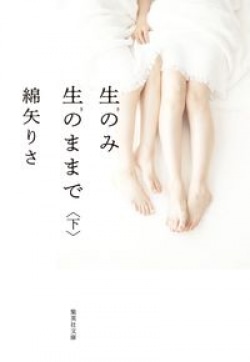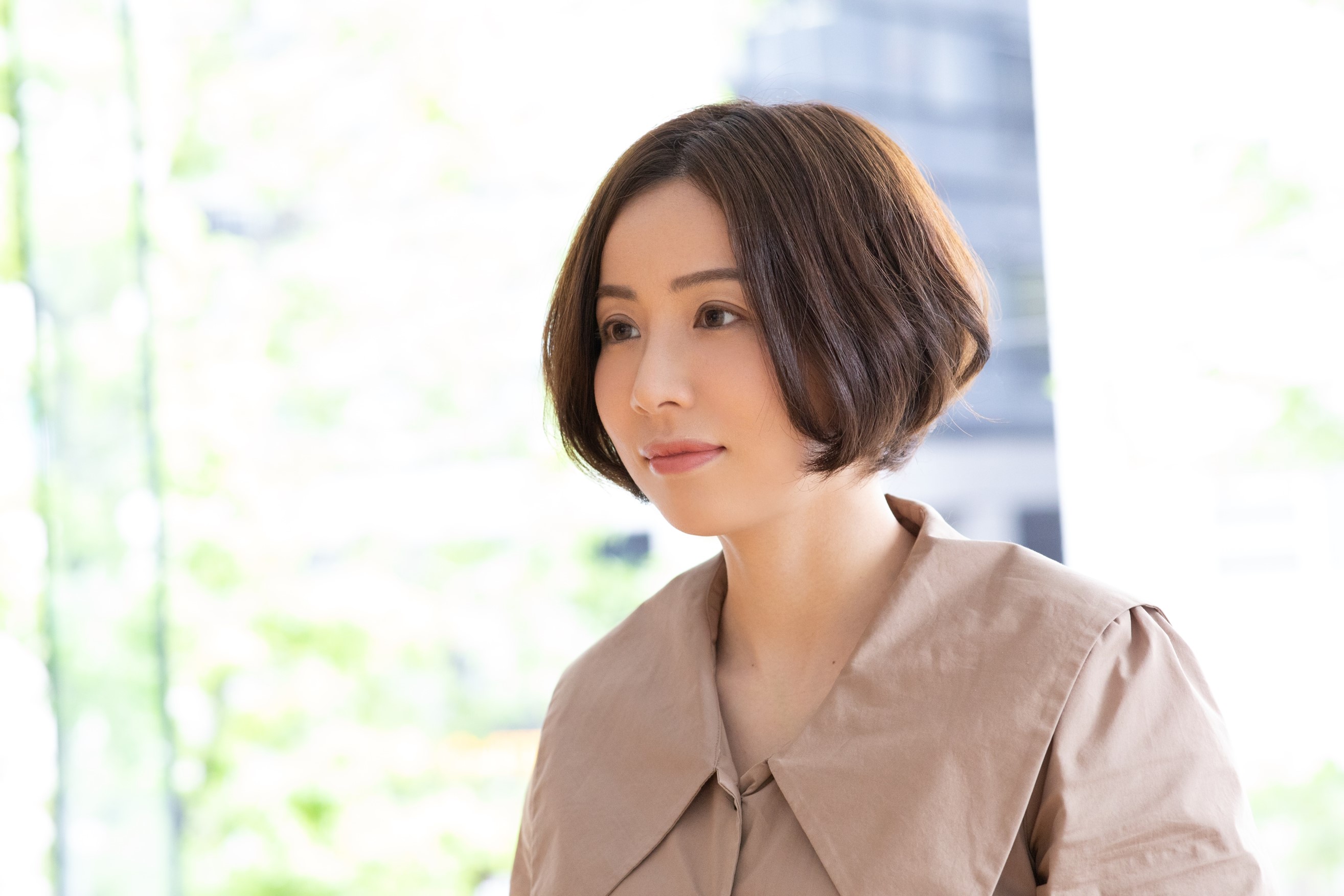Topics
Interview
2022.08.04
Shueisha Bunko’s Like the Taste of Raw Sake
Risa Wataya talks about what it means to “love one another naked with completely bare minds and bodies.”
Loving One Another Naked with Completely Bare Minds and Bodies
Risa Wataya
Risa Wataya Photo by Kaori Imakiire
“Like the Taste of Raw Sake” Risa Wataya
Risa Wataya Photo by Kaori Imakiire
As soon as Risa Wataya’s Like the Taste of Raw Sake was published in 2019, it quickly gathered interest and was referred to as a new frontier for the author. Now that very same novel has been published in paperback. Considering how society’s perspective regarding love, marriage, and gender has changed over the past few years, it’ll be curious to see how new readers react to this story of fervent love. We asked Risa what her thoughts were when she originally wrote the book as well as now, three years later.
Illustrating an intimate relationship between two women for the very first time.
Ai Nanri, the protagonist and narrator of Like the Taste of Raw Sake, has been dating So Maruyama, her upperclassman crush from high school for two years. She goes on a trip with So during the Obon holiday in August. There she meets Saika Shoda, the girlfriend of So’s childhood friend, Takuma Nakanishi. It’s this chance encounter that winds up completely changing the fate of these two women. I imagine you reread your novel in preparation for the paperback publication. What were your thoughts this time around?
When I was writing the novel, I was so engrossed in the process that this wasn’t really intentional, but re-reading it I was struck again by how Ai and Saika’s relationship wasn’t something that had existed in any of my previous novels. Even when compared to other romance novels, their relationship is on a whole different level of healthy. I realized I’ve never really written two characters who sincerely face their love for one another straight on.
That’s true. For example, your romance novels such as Tremble All You Want and Isn’t It a Pity? are really appealing because we’re able to take a look into the true, venomous feelings that the characters are hiding deep in their hearts.
The types of love I’ve depicted may have mainly been distorted, such as one person being much more emotionally invested than the other, or the relationship not quite reaching a romantic stage. In that sense, in this novel I think I illustrated a highly passionate type of love in which both sides are absolutely smitten with the other.
The two women meet when they are 25 years old. Both Ai and Saika are loved by nice, well-rounded men, and neither has ever felt romantic feelings for another woman before. Yet, they both end up betraying their lover. The way these new feelings developed, which not even the women expected, was illustrated so delicately and realistically that as a reader I felt my heart strings being tugged.
Their boyfriends So and Takuma are both wonderful men, and they have the kindness to think first and foremost of their lovers. So, it was quite a challenge deciding how to bring Ai and Saika’s passion alive in a way that would make sense for them to decide to spend their lives together at the cost of breaking up with such boyfriends. Above all, since the story is written from Ai's perspective, we can only interpret the feelings of others through her perspective. That made things quite difficult for me as well. For example, Ai had a rather realistic view of love in the beginning, so she was thrown for a loop by Saika's confession. But Saika’s passionate feelings for her change Ai’s values little by little. Saika on the other hand is a hopeless romantic who thinks their feelings are the most valuable basis for a relationship. She has the strength to defy societal pressure, but she also has a weakness in the sense that she quickly crumbles the moment she feels that her connection with Ai has been lost. By depicting her as someone who relies on their emotional intuition and is unable to stop once they’ve made up their mind, I wanted to show how she became engrossed with Ai from the first glance. I also wanted to boldly illustrate how the two solidify their confidence and conviction regarding their strong love for one another. I’m personally more like Saika, and I admire those with a personality like Ai. So seeing the world from Ai’s point of view was very soothing for me. Just writing the novel made me so happy since I got to think about what it would be like to be someone like her.
Had you decided how their love story would end from the start?
No, I didn't know how it would end either. I did of course know that it would be unnatural to force them to be together. But since they both have their own strengths and weaknesses, I continued writing in the hopes that their individual qualities would balance out their relationship and lead to their happy ending.
I adored the same-sex romance novels written by great literary figures and wanted to try my hand at it.
When this novel was first released, it gathered a lot of attention precisely for the reason that it’s about two women who fall in love. However, I feel that many people who actually read the novel praised it for the fact that it depicted a universal love that doesn’t fit into the pre-existing category of same-sex romance. On the other hand, writer Aya Mizukami wrote in her literary commentary that it’s meaningless to categorize this novel as homosexual or heterosexual romance since the story itself is about escaping the suffocating confines of common sense and societal norms in order to love one another “bare,” or for who they truly are. How did you feel about the various reviews your novel received?
Immediately after my novel was published, I received a variety of feedback. All the feedback made me happy since I got to hear how people’s experiences were reading my novel. I was also very moved by Aya's commentary. When I think back to when I was writing it, I recall really wanting to illustrate their straightforward feelings for one another and the way in which their minds and bodies connected on an emotional level. That desire alone propelled me to continue writing. In the second volume they end up facing various challenges, such as the topic of marriage, their parents, and problems with Saika’s talent agency since she’s a celebrity. When I was writing the second volume, I was in a completely different mindset than when I was writing the first, so the story ended up almost divided in two. That’s likely why there was a variety of opinions. Also, since I’m personally a fan of novels like Junichiro Tanizaki's Quicksand and Yukio Mishima's Confessions of a Mask, I wanted to write a same-sex romance novel that has hints of classic literature while still being set in the modern age. It was also a challenge deciding how much romantic sentimentalism I should maintain while also making sure not to ignore the modern social context. I was curious to see how it would turn out if I wrote such a novel myself.
I knew from the start that I wouldn’t gloss over the sex scenes.
Personally, I feel like the number of sensual scenes in romance novels has drastically gone down over the past ten years or so. They only hint that a sex scene is about to occur and gloss over the actual details. Despite these recent tendencies, your novel provided extremely rich sexual imagery. Not only that, but you illustrated what the women were feeling during the act in such a way that made me read with bated breath, leaving me in a sweet trance from start to finish.
I’m the type of person that feels unsatisfied when a sex scene starts in a drama series and the very next moment it's morning. [laugh] So I decided from the start that I’d thoroughly write out the sex scenes. Ai and Saika have great chemistry and they initially fell for each other on an emotional level. But at the same time, they both had a lot of reservations.
What were your strategies in regards to writing about that? I feel that one of the challenges they faced in the first volume was physical intimacy. It seemed Ai was strongly conflicted about whether or not the emotional love they felt for one another would be enough for her to overcome her dispositions and become receptive to the physical contact involved with making love.
That’s true. Through exploring each other’s bodies, they realize that even though they’re both the same gender, they respond to stimulation in different ways, and they love each other entirely - all of that included. I felt that unless I illustrate how they bare their naked bodies and pour love into one another, readers wouldn’t fully understand just how much they love each other. Also, sex is often associated with taking place at night in the dark, but I wanted to create a world in which they stare at every single inch of each other’s bodies in the light. There’s a line in the novel that goes "Every place is lit by the sun when I'm with you." With that theme of sunlight and shade in my mind, I made sure to take extra care describing in great detail the comfort they felt from making love basked in sunlight.
In Ai's point of view, there were many times they both noticed small details or tackled sensitive topics. I felt they were able to do that because they were both women. Some examples are when they’re removing hair from each other’s bikini area or when they’re getting aroused by each other's breath and gaze. There’s also the time that Ai kicks the edge of Saika’s shoulder and giggles at the bruise that might remain, or when Saika comments that the vitiligo above Ai's hip bone is sexy. These moments felt like secrets only the two of them share. I imagine the sexual subtleties between two women perhaps inevitably turn out completely different than those between a man and a woman. I feel that men probably wouldn’t notice these small things or wouldn’t mention them even if they did for the fear of potentially offending their partner.
Saika in particular is the type of person that displays a lot of interest in physical markings on the body, so she probably would have noticed scratches and bruises on any other lover as well. However, I think she was able to point them out immediately because of the unique dynamic she has with Ai. Because the two know each other so well, they can openly mention whatever crosses their mind when they see each other's face, body, clothing, or makeup, without coming off as critical. Or if it’s something that might affect their health, they can tell each other to fix it.
There comes a moment in which Saika pleads with Ai to give her a scar that’ll last for life. It’s a scene that feels poignantly somber, especially given we’ve followed their journey up to that point.
Saika is the type that pretty much lives in the moment, which is why she wanted proof of something certain in the present. However, Ai refused because by then she had the confidence that she’ll be able to continue loving Saika on a more long-term basis. The two are polar opposites, but they’ve always been honest when airing out their differences.
I must say the title of your novel is truly beautiful. And the line that ties into it on page 172 of volume one is unforgettable. “Until now, even when I was naked, I was not naked at all. I never knew my heart could feel so light by boldly stripping away all common sense and societal norms from my consciousness and embracing only the bare, holding each other tight with not even a stitch of clothing on our bodies.” How were you able to come up with your title?
As I mentioned earlier, when I first decided I wanted to write this story and was mulling over various ideas, the concept for the entire novel suddenly flashed in my mind - a passionate love that burns like sake when guzzled down straight. You know how there’s the phrase "kinomi kinomama" in Japanese, meaning “with only the clothes on one’s back”? I clearly recall wanting to use the kanji “生 (nama)” meaning “raw/bare” in the place of the original kanji “着 (ki)” meaning “wear,” but I don’t really remember much other than that. I’ve also referred to it as "intoxication by nature," and the title really helped me expand on the theme of loving one another naked with completely bare minds and bodies. I don't always come up with the title first; I often come up with it while writing the story. With this novel however I already knew the title from the beginning, so I wrote straight toward it. It’s rare for me to write in that way.
I wonder how your novel Like the Taste of Raw Sake will be perceived by those who read it. I do think it’s a rather provocative novel for the younger generation.
Looking back, my first exposure to provocative culture came from books. I started reading really intense books when I was in the sixth grade or so. [laugh] It was eye-opening to see how so much depth can be expressed in the world of writing, and I think that led me to fall deeper and deeper in love with books. I believe what you read at an age when your sensibilities are still soft and malleable will make a huge difference in how they turn out, so I personally hope that anyone even a slight bit interested in my novel will read it without feeling restricted by their age.
Text by: Asako Miura (Writer & Book Counselor)
Original post
http://seidoku.shueisha.co.jp/2207/read04.html
http://seidoku.shueisha.co.jp/2207/read04.html








